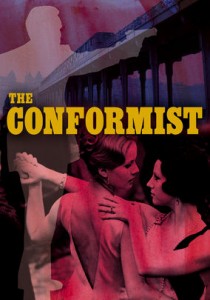The Conformist-1970
Director Bernardo Bertolucci
Starring Jean-Louis Trintignant, Stefania Sandrelli, Dominique Sanda
Top 250 Films #34
Scott’s Review #212
Reviewed January 10, 2015
Grade: A
The Conformist, directed by Italian director Bernardo Bertolucci and based on the 1950s novel by Alberto Moravia, is a complex film that tells the story of one man’s complicated life during the Italian Fascist era (1922-1943).
Due to a traumatic childhood event, he is troubled and strives to “conform” to a “normal”, traditional lifestyle despite his underlying wounds and desires, which he struggles to repress.
The character in question is Marcello Clerici, played by Jean-Louis Trintignant, who works for the secret police in support of the Fascist government.
Marcello yearns for a quiet life that everyone else seems to have. He is set up with a beautiful new wife and is ordered to assassinate his college professor, who is a leader of an anti-Fascist party.
Throughout the story, Marcello is tormented by his troubled childhood in flashbacks, and the film delivers a marvelous, creative use of camera angles, style, and design.
It is a dreamlike film that makes full use of the protagonist’s childhood memories.
The film is a character study in the highest regard, yet it is also beautiful to look at, making it very multifaceted. Marcello is troubled, as evidenced by his backstory. In many ways, he is weak, refusing to accept who he is or admit his deepest desires.
Mixed in with the complexity of his character is a unique character named Anna (Dominique Sanda), the college professor’s gorgeous blonde wife, who appears to be bisexual, enticing both Marcello and his wife, Giulia, played by Stefania Sandrelli.
Marcello, in particular, becomes transfixed and obsessed with Anna.
A truly heartbreaking moment arrives later in the film and is my favorite scene in The Conformist. As the assassination attempt is made on a lonely and secluded, yet picturesque country road, the result is murder, betrayal, and surprise.
When one character nonverbally speaks to another, mainly through facial expressions, and emotionally and pathetically pleads for their life through a car window, it is as tragic as it is poetic.
The scene is wrought with drama and sadness.
Additionally, Marcello’s troubled childhood involving a homosexual experience with a chauffeur named Lino resurfaces years later in an unlikely way and leads to the shocking conclusion of the film.
The very last frame of the film leaves the viewer pondering what is to become of Marcello next.
Marcello’s mother and father add mysterious layers to the film. His father is securely an inmate in a mental hospital, while his mother is a boozy older woman who sleeps until noon.
While these characters are not explored as thoroughly as they might have been, this exploration does lead one to ponder why Marcello is the way he is and whether his parents have any bearing on his persona.
In a particularly fascinating scene, Anna seductively dances with Marcello’s wife at a crowded dancehall; they do the tango, even as, amid her affair with Marcello, she is clearly in love with his wife, making the dynamic confusing yet fascinating to view.
The Conformist heavily influenced storied directors such as Frances Ford Coppola, Martin Scorsese, and Steven Spielberg. A beautiful scene of leaves blowing in the wind almost mirrors a similar scene contained in Coppola’s The Godfather: Part II (1974).
A film as captivating as it is influential, The Conformist is an interesting watch for its style and the mystique that surrounds it.
Oscar Nominations: Best Screenplay Based on Material from Another Medium
